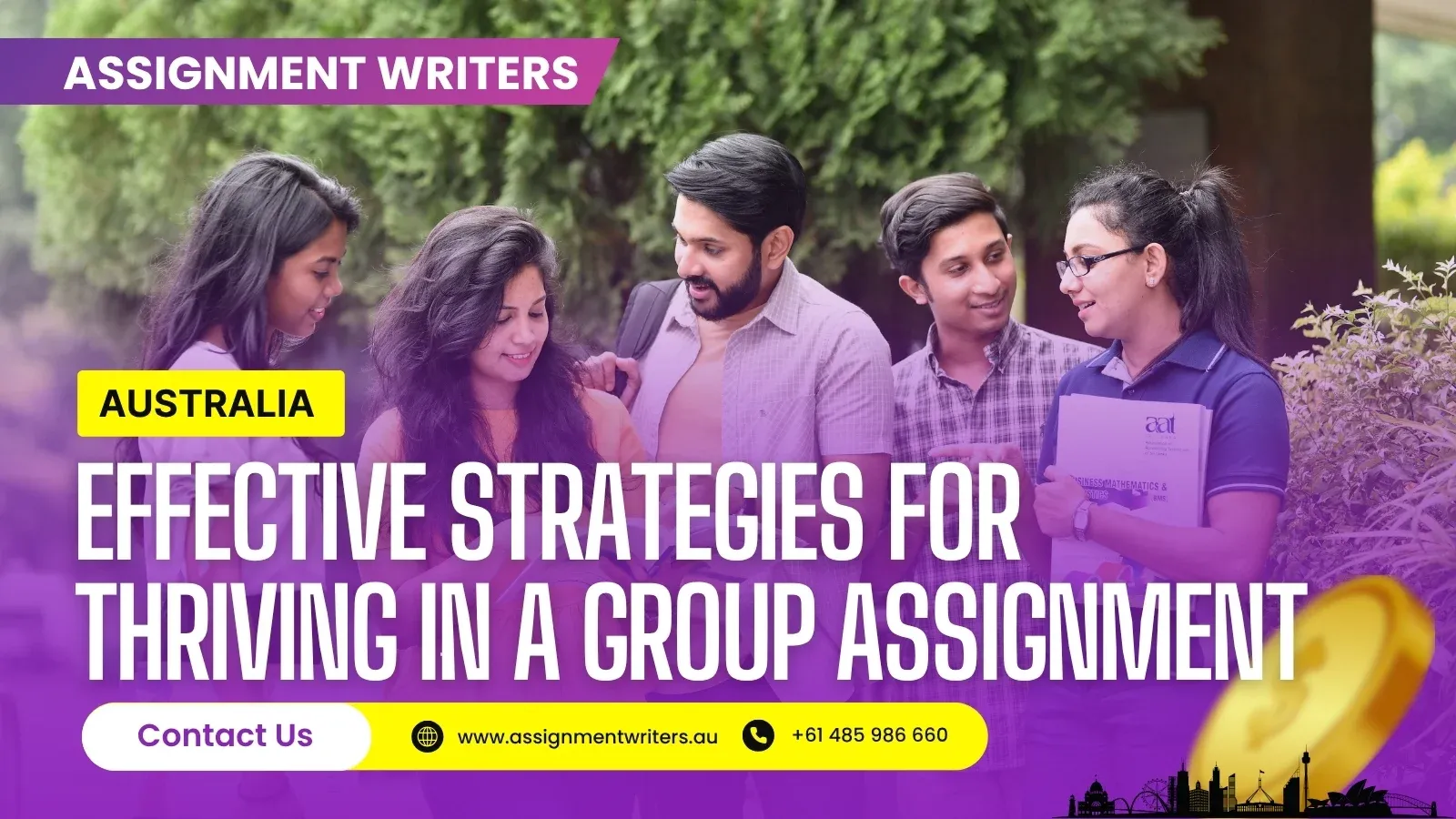You might have heard of group studies during your academic years but are you aware about group assignments? As a student, you understand how integral they are to your success and scoring high grades in all of your assignments. Group assignment are helpful to students as they can develop skills of teamwork, problem-solving, and communication as well. However, managing group projects with proper effect requires organisation and collaboration with your group members.
Through the help of this blog, you can explore the essential strategies making group assignments a success along with insights on teamwork, project management and online assignment help too.
Teamwork in Assignments
Why is teamwork important? Teamwork is important to get success with your group assignments scoring high grades in class. Here are some key strategies to make sure the collaboration between different individuals is smooth -
1. Establish Clear Communication
- Be open about your Point of View on a certain topic as it is the foundation of a successful teamwork.
- While communicating with your team, make sure to use digital tools such as Slack, WhatsApp, Zoom, or Trello for easier and efficient communication.
- Scheduling regular meetings to discuss the progress, challenges and solutions to the problems you or any other team member might be facing.
- This encourages the team members to actively listen and provide feedback during the discussion.
- Clarify the expectations from the project to avoid any misunderstandings when working on the project.
2. Define Roles and Responsibilities
- Make sure you are aware of the strengths and expertise of each team member.
- This will help in clearly defining roles avoiding responsibilities with each other.
- The responsibilities should rotate from time to time enhancing learning and engagement of the team.
- Every member of the team should know about their productivity.
- Outline the responsibilities to maintain clarity between each team member.
3. Set Goals and Deadlines
- The project should break down into smaller tasks by giving a deadline for each of the tasks.
- For easier collaboration between team members, create Google Docs, or MS words file with open to all access.
- Make sure to set reminders and follow up calls with your team members to keep the progress steady and going.
- You should have set specific milestones for your project to keep a track of achievements and motivate the team members.
- The deadline should be maintained properly in order to complete the goals of the project.
4. Encourage Collaboration and Respect
- The different perspectives should be encouraged for equal participation.
- Conduct brainstorming sessions to create different ideas.
- Give your team members feedback on their work to maintain the quality and enhance the learning experience.
- Create an environment for your team members where they feel comfortable sharing their ideas.
- Make sure you create a problem solving environment for your team members.
Group Project Tips
To run a group project well, it is best to plan as properly and thoroughly as possible. Here are some considerations:
1. Plan Before You Start
- Understand project requirements and then divide them accordingly.
- Then write a detailed plan or roadmap that lays out the flow of work.
- Establish deadlines for each element of the project.
- Think about what challenges may emerge and make plans for contingencies.
- When everyone agrees on the project plan and direction for work, then it can begin.
2. Make Use of Technology
- Use a range of project management platforms such as Asana, Notion, Monday.com, for planning.
- Use Zoom or Google Meet to schedule virtual meetings to discuss the project.
- Work on shared documents so updates can occur in real time.
- A cloud-based storage system should be used to make files and documents easy to access.
- Use shared "whiteboards," like Miro, to develop ideas in real time.
3. Address Conflicts Proactively
- Foster open discussions to address misunderstandings, and
- Be solution-focused rather than blame-focused.
- If those discussions don't work, consider bringing in a mediator or a professor if possible.
- At the outset of the project, outline possible ways to handle conflict as a situation arises.
- Foster a sense of empathy, and willingness to understand and compromise if needed.
4. Conduct Regular Reviews
- Periodically assess progress to chance with a plan for addressing outcomes that require change.
- Work together with the team to verify everyone is doing their fair share of the work.
- Plan to check in halfway through the project to reassess the project direction and expectations.
- Document project challenges and what could be improved for next time.
Managing Group Assignments
Group study sessions can enhance both mutual understanding as well as the retention of information. Here are strategies that are effective:
1. Choose a Team Leader
- Establish specific study goals for each study session or day.
- Have students in a group decide who will take certain aspects of a topic to encourage knowledge transfer.
- Plan time for discussion, to explain, and for review.
- Create a study calendar for the group to keep each of them coordinated with their study plan.
- After each person has shared their part of the study, establish a time frame for students to stay focused and avoid distractions.
2. Practice Effective Time Management
- Have members practice asking and answering questions.
- Practice ‘teach-back’ principles to encourage students to learn together.
- Have students discuss and explain how they, or others they may have known, would apply the knowledge gained from the study to real-world applications.
- Consider forming smaller sub-groups with specific studying problems to narrow your study.
- Have students take turns being the leader of the discussion.
3. Promote Accountability
- Engage members of the group in making flashcards, study quiz, mind-mapping, etc.,
- Have members watch educational videos, then join discussion group chats or discussions about the unit of study.
- Members can create their own note-taking methods or summarize notes or content relevant for a quick reference or review.
- Use AI tutoring apps to explain difficult concepts to members as needed.
- Engage in group activities to complete a study unit.
4. Review Before Submission
- Group members can keep their study style interactive, and members can keep their study material/tone engaging.
- As members study milestones, then maintaining simply rewards progress for study.
- Nominate the place of study to focus on studying, so you can avoid distractions.
- Utilise gamification styles of learning, such as quizzes and rewards when studying.
- Schedule brief mental breaks to ensure there is no build up of stress due to longer periods of learning.
Group Study Strategies
Group study sessions can enhance both mutual understanding as well as the retention of information. Here are strategies that are effective -
1. Develop a Study Plan
- Establish specific study goals for each study session or day.
- Have students in a group decide who will take certain aspects of a topic to encourage knowledge transfer.
- Plan time for discussion, to explain, and for review.
- Create a study calendar for the group to keep each of them coordinated with their study plan.
- After each person has shared their part of the study, establish a time frame for students to stay focused and avoid distractions.
2. Encourage Active Participation
- Have members practice asking and answering questions.
- Practice ‘teach-back’ principles to encourage students to learn together.
- Have students discuss and explain how they, or others they may have known, would apply the knowledge gained from the study to real-world applications.
- Consider forming smaller sub-groups with specific studying problems to narrow your study.
- Have students take turns being the leader of the discussion.
3. Utilise Study Aids
- Engage members of the group in making flashcards, study quiz, mind-mapping, etc.,
- Have members watch educational videos, then join discussion group chats or discussions about the unit of study.
- Members can create their own note-taking methods or summarize notes or content relevant for a quick reference or review.
- Use AI tutoring apps to explain difficult concepts to members as needed.
- Engage in group activities to complete a study unit.
4. Maintain Motivation and Engagement
- Group members can keep their study style interactive, and members can keep their study material/tone engaging.
- As members study milestones, then maintaining simply rewards progress for study.
- Nominate the place of study to focus on studying, so you can avoid distractions.
- Utilise gamification styles of learning, such as quizzes and rewards when studying.
- Schedule brief mental breaks to ensure there is no build up of stress due to longer periods of learning.
Online Assignment Help
Online assignment help Australia is a helpful resource for students looking for academic support. Here is a step-by-step guide to maximising the experience:
1. Benefits of Online Assistance
- Gives you trouble-free answers for complex issues, through expertise.
- Saves considerable time, which allows you to be less stressed, with looming deadlines.
- Assists understanding, with the help of well-researched solutions.
- Gives student examples and applicable reference papers.
- Provides assistance in improving writing and formatting skills.
2. Choosing Reliable Platforms
- Choose a service with credible reviews and verified credentials.
- Be sure that the assignment help service has original and non-plagiarised work.
- Verify that they have a revision policy or money-back guarantee.
- Confirm that the service will offer fair prices for value.
- Make sure you check and validate that their experts and tutors have qualifications (relevant to that subject).
3. Using Online Help Effectively
- Use the answer you are provided as classroom reference material.
- Consider the explanations or examples included to learn the functions of better understanding.
- Think about consulting a tutor for clarification from the assignment help service, before turning in your assignments.
- Avoid dependencies on the service, you will want to rely on yourself.
- Use it as a study aid, rather than a means to surplus yourself in your education.
4. Ethical Considerations
- Do not submit pre-written work as your own.Use online assistance as an educational support tool, not a shortcut.
- Conduct yourself in an ethical way and follow your institution's academic integrity policy and avoid plagiarism.
- When you use work from other sources in your assignment,
- Use appropriate citations to provide the author or organization appropriate credit.
- Encourage self-help for research and personal critical thinking skills, along with online help.
Conclusion
If a group project is well-organized, it can be an outstanding learning opportunity to develop skills in teamwork, communication, and time management. Students in a group project can achieve success if each group member understands the goals of the assignment, defines their roles as a member of the group, and keeps the lines of communication open to discuss expectations and progress. Using a strategic approach to group study, along with the help of online assignment services, can help you perform better than expected on individual and group assignments. Following these strategies can help ensure that not only do students complete their group assignments, but benefit from the learning experience as well.

